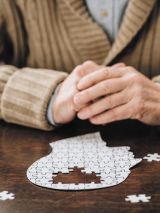An afternoon with Ita
There are few people so famous they’re known by their first name. Ita Buttrose is one of them. An invitation to have a cup of tea with the Chair of the ABC is special, and extra special when it’s Ita.
By Ian Henschke

Ita Buttrose’s journalistic life began as 15-year-old copy girl. She’s accomplished things most could only dream of during a 65-year brilliant career. As Editor of the Australian Women’s Weekly she increased sales to more than one million, founded the ground-breaking '70s magazine Cleo, and became a publisher herself in 1989 by launching ITA, ‘for the woman who wasn’t born yesterday’.
Beyond the media, the former Australian of the Year has also dedicated her time and energy towards charitable causes, including the National Advisory Committee on AIDS as Chair, Dementia Australia as Chair and later National Ambassador, Macular Disease Foundation Australia as Patron, and Arthritis Australia as Chair. She was appointed Chair of the ABC in 2019.
I begin by asking about two big birthdays, the ABC’s 90th and her 80th.
Q. What did the ABC’s 90th birthday mean to you?
We’re the most trusted institution in Australia, and we’re the most important cultural and media organisation, so it’s an honour to chair it. Over the years, we’ve covered every important historic moment that’s affected Australia. We’re expanding more into the regional areas as commercial media outlets withdraw. We’ve got a new scheme where we’ve put 50 new journalists into regional and rural Australia, some places in which we’re not represented and in others we’ve enlarged our representation, so I think we’ve played a very significant role.
Q. How important was the Four Corners report on aged care?
It was extremely important because it shone a light on a huge problem [that] governments had been trying to hide.
Q. What about turning 80 this year?
I know when Dad turned 80, I thought, 'whoa that’s a very significant age'. And I’m only 10 years younger than the ABC. You think 'God almighty, I’ve grown up with this organisation'.
It’s been a big influence on my life because my father worked at the ABC. When he retired, he was Assistant General Manager, so he had a very long and distinguished career here.
Q. You were in the ABC’s 90th anniversary special where guests were asked to comment on archival footage of themselves. How was that?
It’s quite interesting when you look back and reflect on all the things you’ve done, and I said, “every now and again journalism allows us to make a difference, and when that happens it’s a really good feeling.”
Q. What’s the biggest difference you’ve personally made?
Raising awareness of HIV and AIDS back in the '80s when I was Chair of the National Advisory Committee on AIDS, pleading for more tolerance in the community about homosexuality, saying to parents: “Would you love your child any less if he or she were gay? Of course, you wouldn’t.” Much later I did a lot of work in health. And I certainly think I made a difference in dementia.
I spoke about the need for a better investment in research and Tony Abbott heard my plea and gave $200 million over five years in 2013. I think the brain is the last medical frontier. The more research we can do, the closer we are to understanding the brain and its many functions, but most importantly we might find a breakthrough and, ultimately, a cure for dementia, which is the most feared disease among older Australians.
Q. What about your own health?
I go [to a gym] for an hour session twice and week and, boy, they work me hard. My strength’s really good. I’m a great believer in physical exercise as we get older. It does help push back the effects of ageing. It’s so crucial to our health.
"Without the ABC and without that story about the shocking plight of older people in aged care, we wouldn’t have had the Aged Care Royal Commission."

Q. Are older Australians well served by modern media?
There’s a feeling among older people that we are ignored and to some extent that’s correct. We have different tastes, different life experiences that make us look for other experiences a younger person might not want. So, we’re looking for a different line of television show, different radio listening, and things we’re interested in younger people aren’t interested in. We probably weren’t either when we were their age, but we have a different perspective. We have more time. We have a lot of knowledge, and we’re always looking for ways to expand our knowledge. And we want to get our point of view heard.
Q. What do you think of our Let Pensioners Work campaign?
It’s a terrific campaign, and long overdue. I don’t understand why we make it so difficult to let pensioners work. They’re not going to be earning mega-millions like some of the corporate bosses in Australia. They’re just looking for something to make their lives a little more bearable because the pension is not the lavish lifestyle.
We have a shortage, and we’ve got skilled older workers who’d love to work. I remember reading research about workers in Holland. They retrained a lot of older workers and they turned out to be more efficient, less time-wasting than younger workers. Well, of course, because they want the job. And we need a different attitude to employing older people.
The jobs are there. They can’t get people to fill them. There are older people that would do it, but the pension is important to them for all the reasons that we know.
Q. In New Zealand, pensioners work and just pay income tax…
I couldn’t agree more. Why is there this discrimination against older Australians? Because we’re far too polite. We should take comfort in our numbers. There are so many of us, we should use our power and our voice to say to the government, ‘we’re getting a raw deal. We want a better deal.’
Q. Is there anything you look back on and say I wish I had done something differently?
No. I don’t look back like that because you can’t change anything that you’ve done. You have to live with what you’ve done. At the end of the day, you have to be comfortable with the person you are right now. Everything I’ve done in my life has shaped me into the woman I am today. Am I comfortable with that woman? Yes, I am.
Q. Are you going to have a renewal of your ABC contract? They often start talking about that once you get three years into a five-year job.
So far, they haven’t had a discussion with me about that. You’ll have to stay tuned.
We both start laughing. I thank her and say I hope we talk again. Ita says she looks forward to that. I can see why Cold Chisel had a hit half her lifetime ago with the lyrics “I believe in what she says. Yes, I do ... How could I not believe, when Ita tells me to.”
This article is featured in the Spring 2022 issue of National Seniors Australia’s quarterly member magazine, Our Generation.
Become a member today and receive four free hard copy issues of Our Generation (valued at $39.80) a year as part of your membership, along with exclusive discounts, competitions, branch membership and more!
Your membership directly funds our advocacy and research work that benefits older Australians including fixing pension poverty, tackling health care costs, and improving aged care.



